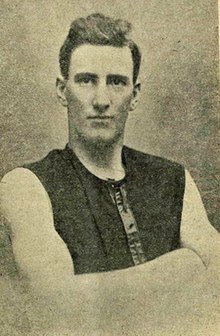Walter Scott (footballer)
| Walter Scott | |||
|---|---|---|---|
 |
|||
| Personal information | |||
| Date of birth | 2 September 1899 | ||
| Date of death | 27 July 1989 (aged 89) | ||
| Original team(s) | Stirling | ||
| Position(s) | Centre half-back | ||
| Playing career1 | |||
| Years | Club | Games (Goals) | |
| 1920–1932 | Norwood | 174 (3) | |
| Representative team honours | |||
| Years | Team | Games (Goals) | |
| South Australia | 38 | ||
| Coaching career | |||
| Years | Club | Games (W–L–D) | |
| 1926–1930, 1932 | Norwood | 109 (65–42–2) | |
| 1933–1935 | West Adelaide | 51 (13–37–1) | |
| 1936–1937 | Glenelg | 34 (7–26–1) | |
| 1938–1939 | Sturt | 34 (11–23–0) | |
|
1 Playing statistics correct to the end of 1932.
|
|||
| Career highlights | |||
|
|||
| Source: AustralianFootball.com | |||
Walter "Wacka" or "Wat" Scott (2 September 1899 – 27 July 1989) was an Australian rules footballer who represented Norwood in the South Australian National Football League (SANFL) during the early 20th century. Scott was a high marking defender who had a large influence during a very successful part of the Norwood Football Club's history.
Scott was born in Stirling, South Australia and played his early football with an inflated pig's bladder at school. He took his first job at the age of 13 as an apprentice electrician with the company Morrison and Gwynne. The three senior partners – J. Morrison, G. C. Gwynne and Algie Millhouse – all played for Norwood, and Millhouse had captained the club in 1914. Scott lived in the city during this time, but returned home during the weekends, during which he played for Stirling in the Hills Association until 1919.
His high marking and sound defensive skills immediately drew praise and in his first season he won his new club's best and fairest award.
In his second season, he tied with Dan Moriarty of South Adelaide for the 1921 Magarey Medal. Under the rules that applied at that time, the Leagues umpires were called to deliberate and in the event chose to award the medal to Moriarty. Scott went on to win two Magarey Medals outright in 1924 and 1930. In 1998 the SANFL retrospectively awarded medals to all players who had tied for the medal but lost on a "countback" or by such adjudication. Thus some 76 years after the event (and posthumously) he acquired his third medal.
In 1922 Norwood won the premiership, the first for Scott. He played in three more premierships with Norwood, including as captain-coach of the 1929 team. He won Norwood's best and fairest award a record six times.
...
Wikipedia
